News & Stories
2025
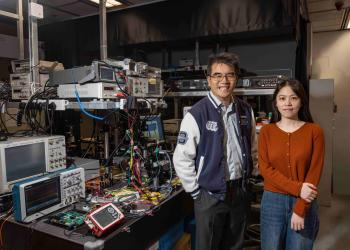
News
HKUST Engineering Researchers Developed a Novel Photodetector to Enhance the Performance of On-Chip Light Monitoring Advancing Applications in Programmable Photonics, Biosensing, and Lab-On-Chip Technologies
Programmable photonics promise faster and more energy-efficient computing than traditional electronics by using light to transmit signals. However, current systems are limited by the need for precise on-chip power monitors. Researchers from the School of Engineering at The Hong Kong University of Science and Technology (HKUST) have developed a germanium-ion-implanted silicon waveguide photodiode. This novel photodetector achieves high responsivity, ultra-low optical loss, and minimal dark current, significantly enhancing the performance of on-chip light monitoring. It provides core hardware for energy-saving and ultra-sensitive biosensing systems, facilitating practical applications in programmable photonics.
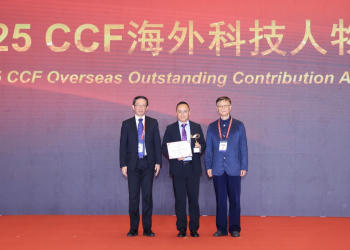
News
Prof. XIE Yuan Awarded 2025 Overseas Outstanding Contribution Award by China Computer Federation
Prof. XIE Yuan, Fang Professor of Engineering and Chair Professor of the Department of Electronic and Computer Engineering and the Department of Computer Science and Engineering, was honored with a 2025 CCF Overseas Outstanding Contribution Award by China Computer Federation (CCF). He is concurrently Director of the Jockey Club STEM Lab of Future Advanced Computing Technologies (FACT Lab) and the Institute of Integrated Circuits and Systems at HKUST.

News
HKUST Engineering Researchers Develop High-Performance Quantum Red QR-LEDs to Boost Colour Vividness and Brightness in Displays
A research team led by the School of Engineering of The Hong Kong University of Science and Technology (HKUST) has made significant advances in quantum rod light-emitting diodes (QR-LEDs), setting record-high efficiency level for red QR-LEDs. This innovation is poised to revolutionize next-generation display and lighting technologies, offering smartphone and television users a vibrant and enhanced visual experience.LEDs have been widely used in electronic products for decades. Recent developments in quantum materials have given rise to quantum dot LEDs (QD-LEDs) and QR-LEDs. QD-LEDs offer superior color purity (color vividness) and higher brightness compared to current mainstream LEDs. However, outcoupling efficiency has now become the primary obstacle, as it sets a fundamental ceiling for external quantum efficiency (EQE), thereby hindering any further performance improvements.
Stories
Neural Engineer Prof. WANG Yiwen Drives Impactful Brain-Machine Interface Research for the Disabled
Prof. WANG Yiwen, Associate Professor in the Department of Electronic and Computer Engineering (ECE) and Department of Chemical and Biological Engineering (CBE) at HKUST, develops brain-machine interfaces that restore motor function to paralyzed patients. Her journey from dismantling bicycles to pioneering neural engineering reveals how curiosity, resilience, and mentorship can literally transform lives.
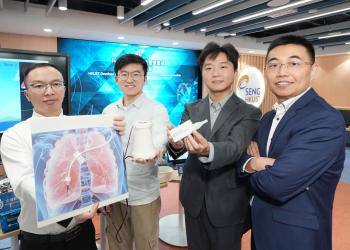
Stories
Fusing AI and Robotics: The Future of Smarter Healthcare is Within Reach
Global healthcare is facing a wide range of challenges, including ageing populations and an increase in chronic diseases, which are putting immense strain on healthcare systems. The demand for advanced medical technologies like less invasive and more precise surgical tools has never been more urgent. The situation prompted a global wave of innovation in micro-scale medical robotics designed to assist clinicians with unprecedented accuracy and effectiveness.
This ambition drives Professor SHEN Yajing and his research team at The Hong Kong University of Science and Technology (HKUST)’s Department of Electronic and Computer Engineering on their journey toward medical innovation. Integrating artificial intelligence (AI) and robotics technologies, they have recently developed three pioneering smart medical devices for health monitoring, surgical assistance, and rehabilitation, ushering in a new era of smart healthcare.
News
Seven HKUST Projects Secure Funding in RAISe+ Second Round
The Hong Kong University of Science and Technology (HKUST) has shone in the second round of Research, Academic and Industry Sectors One-plus (RAISe+) Scheme launched by Innovation and Technology Commission’s (ITC), securing grants for seven teams – the highest number among local institutions.
The seven funded projects encompass a diverse array of innovative research and development efforts. Three projects focus on health and medical innovation, addressing areas spanning diagnostics, medical treatment and gene therapy. Three others focus on AI chips, semiconductors and their materials, while the remaining one explores novel displays and optoelectronic technology.
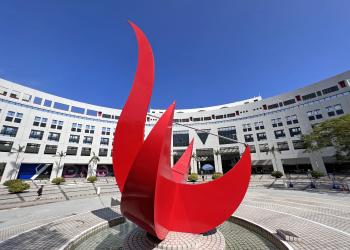
News
HKUST Leads Local Institutions in RAISe+ Scheme with 7 Funded Projects
The Hong Kong University of Science and Technology (HKUST) has emerged as the top-performing local institution in the second round of the Innovation and Technology Commission’s (ITC) Research, Academic and Industry Sectors One-plus (RAISe+) Scheme, securing funding for seven projects. Spanning health and medical sciences, artificial intelligence (AI) and robotics, advanced manufacturing, and electrical and electronic engineering, these projects underscore HKUST’s leadership in transforming pioneering research into real-world applications.
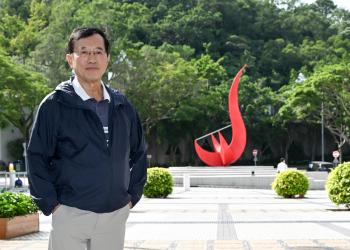
Stories
Igniting Innovation and Entrepreneurship
Academic-entrepreneur Professor KO Ping-Keung came to HKUST in 1993 as Visiting Professor in the Department of Electronic and Computer Engineering after working at the University of California, Berkeley, as Director of the Microfabrication Laboratory from 1984-1993, and Vice-Chairman of the Department of Electrical Engineering and Computer Sciences from 1991-1993. He served as Dean of the HKUST School of Engineering from 1995-2000 and in 2002 received the prestigious IEEE Solid-State Circuits Award. He has since become an innovator and angel investor in China’s chip industry and is a Professor Emeritus at HKUST. In 2024, Prof. Ko was awarded a HKUST Honorary Fellowship in recognition of his long-standing service and commitment to the University’s development.








